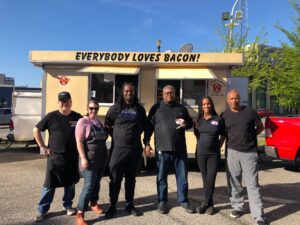Troy King With the Louisville Food Truck Association Continues to Champion Local Culinary Ventures
Writer / Carrie Vittitoe
Photography Provided
Troy King is what you might call a serial entrepreneur – a man who thinks about ways to work smarter, not harder, oftentimes coming up with a bona fide business plan as a result.
He admits to having lots of ideas, but attributes a large portion of his success as co-owner of Velvet Couch Hospitality Group to his wife, Selena Johnson, an accountant who ensures his ideas are financially feasible. While King handles operations at their various food endeavors, Johnson handles everything administrative and financial. “She’s the backbone,” he says.
King has retired from a career as a police officer, and says he has always cooked and had an interest in food. “My father wasn’t a big proponent of fast food,” he says. “He worked third shift, so we had to come home and cook.”
As a teenager in Chicago, King had a job at a hot dog restaurant, so when he purchased and began running a hot dog cart in Louisville in 2008 after leaving the police force, it was almost like a return to his roots. The cart was a cheap and quick way to get into the industry. “I knew I didn’t want to work for anyone else ever again,” he adds.
A couple years after purchasing the cart, he became a manager at Tom & Chee in 2011, gaining more experience and knowledge in the overall food industry. He met Johnson in 2013 and she encouraged him to get a food truck, which he did in June 2014, calling it Pollo: A Gourmet Chicken Joint. Business ventures and opportunities began to snowball.
In 2019 he and Johnson signed a lease and opened their restaurant, Six Forks Burger Company. In 2022 he became the chief executive officer of the Louisville Food Truck Association (LFTA), with Johnson serving as treasurer. They plan to open a food truck park in 2024 called Jubilee Field, an outdoor entertainment venue with a space for stationary food trucks called Culinary Row.
“The one thing I love about food trucking is you don’t have to have any type of education,” King says. “Sometimes the lack of education hinders individuals from getting into certain fields. I want to break those barriers for young people.”
At Culinary Row, they plan to reserve a food trailer for individuals who have challenges that could serve as hindrances. For example, one food truck trailer is only going to be rented to a mother who is a single parent.
When it comes to food truck entrepreneurialism, there are a lot of benefits. First, it is simply less costly to get into than a restaurant. “We probably spent $100,000 building our restaurant, and maybe $25,000-$30,000 opening a food truck,” King says. “There is definitely a financial difference.”
Another big difference is the way in which a food truck allows the owner to move and travel, which King likes. “We have traveled to the Grand Canyon, New Orleans and Atlanta,” he says. The couple’s 7-year-old daughter has already been to 25 states. The flexibility of food trucking was one reason for their decision to close their brick-and-mortar Six Forks Burger Company in September 2023, despite its success. When King publicly announced the closure by video, he acknowledged that running the restaurant simply didn’t work for the lifestyle his family wants to have.
 King says traveling with a food truck is fairly easy; you just have to check in with the local health department wherever you’re going. “Some municipalities may require you to get a business license as well,” he says.
King says traveling with a food truck is fairly easy; you just have to check in with the local health department wherever you’re going. “Some municipalities may require you to get a business license as well,” he says.
He explains that when a food truck goes to another area for a festival or event, the host generally acquires any legal paperwork that vendors need to have. “We are the only food vendor from Kentucky that attends the National Fried Chicken Festival in New Orleans every year,” King says. “That host gets all necessary licenses and permits.”
Looking in from outside the industry, it may seem that food trucking could be at odds with brick-and-mortar restaurants, but King says they can and do work hand in hand. “You go to Los Angeles or Chicago, and most restaurants have a food truck,” he says. “In our case, we were food truckers first.”
Even longtime restaurants like Chick-fil-A, White Castle and Olive Garden have seen the advantages of food trucks. “Restaurants have seen that food trucking is here to stay,” King says.
King played a big role in ensuring food trucking is here to stay in Louisville. In 2017 he and another food truck entrepreneur sued city government because of rules placed on food trucks, which were aimed at protecting restaurants. The U.S. district court ruled in favor of food truck operators in 2018. Since that time, King says Louisville has become a welcoming city for food trucks.
As part of his role with the Louisville Food Truck Association, King helps people who are interested in food trucks and the financial rewards they can bring, by sharing knowledge and making it easier for them to learn about and enter the industry. He collaborated with several government agencies including Alcoholic Beverage Control, the entity that regulates food trucks, to offer pop-up clinics to teach people how to safely and legally operate a food truck.
King also hopes to purchase a warehouse and create a food truck commissary. “It’s going to be a place where I keep all my food trucks,” he says. “I’m also going to build a classroom and train new food truckers because I get a lot of phone calls from people who want to buy a food truck.”
To spread the word about the Louisville Food Truck Association and promote food trucks in general, King has created Food Truck Invasions throughout Louisville and surrounding areas. “We invade cities and neighborhoods with food trucks,” he says. “It’s become very successful. It looks like it is something that just happens, but it is very much planned. The invasion in May 2023 in Shepherdsville had 21 food trucks and approximately 4,000 people in attendance.
“It is my wish to make the LFTA just as powerful as the Kentucky Restaurant Association,” he says.
Over the years, one of the lessons King has learned is the non-food skills needed to own and operate a food truck – the kind of skills that involve construction tools, and are aimed at taking a trailer and converting it into an attractive and usable food truck. He uses his know-how in another business venture, Derby City Mobile Kitchens. “We build food trucks for ourselves and other people,” he says. He has a plan to trick out a food truck for his daughter’s Girl Scouts troop, making it easier for them to sell when cookie season rolls around.
While one might assume that King never sleeps, given his business plans and projects, he says he goes to bed early but wakes early when no one else is up, so he can think and research. Perhaps it is because he has already retired from one career, or his diagnosis last year with diabetes, but King thinks thoroughly about how the lifestyle he wants to lead intersects with his food businesses. For example, he enjoys hunting hogs, and is considering buying a farm in Texas. He says the goal is to take people on culinary adventures to hunt, dress and cook their own hogs in the same day.
If all of his other ventures are any indication, as long as Johnson gives the word that his idea makes financial sense, King will see that it gets done.





